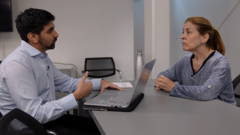Dominic Casciani
Home and Legal Correspondent•@BBCDomC
PA Media
Court No 1 of the Old Bailey
We’ve all seen the movie.
The dodgy witness is getting away with it until the wily lawyer mauls their evidence in the witness box, thanks to long nights preparing for just that moment.
There are tears of joy and a judge banging a gavel (only in American courts, mind). The post-script tells us that the case made the world a better place.
Not so fast.
Every day there are legal battles that the little man or woman loses. And very often they lose because they can’t cannot afford to fight their corner against a wealthier opponent.
This is where artificial intelligence, the most talked-about subject of the last two years, could transform justice and fairness in society.
The legal world is agog with excitement about what AI is doing to the law.
Systems are being devised to not only carry out basic work, like contract-writing, but also to analyse thousands of pages of evidence in the most complex of cases.
And this revolution isn’t just happening in the skyscrapers of global law firms, but quietly in places like the Westway Trust’s Cost of Living Crisis Clinic in London.
This advice clinic in London helps clients in one of the poorest neighbourhoods in England deal with a raft of complicated disputes – from benefits appeals to disputes with landlords.
The Westway Trust team is now using AI tools to help advise clients
One client tells the BBC how she has been made homeless because the landlord cancelled her tenancy.
“I’m a professional person – and I am not used to finding myself in this kind of situation,” she says.
“It’s distressing, destabilising and being homeless, also at my age, is quite difficult.”
There is legal aid for the absolute poorest in society – but it is means-tested and extremely limited. Many people give up on their fight against something they instinctively know has been an injustice.
So what’s this got to do with artificial intelligence? Going to court can be cripplingly expensive. The aim of anyone sensible is to get a resolution long before that point. And that requires expert advice.
Adam Samji is a paralegal adviser at the Westway. He helps to prepare a case by researching whether a client has a point worth fighting against, say, a rogue landlord or government rejection of a benefits application.
An eligibility assessment for benefits can run to 60 pages. Each individual case can take hours of careful analysis of personal circumstances.
The Westway is now using AI tools to cut through these kin
Read More





